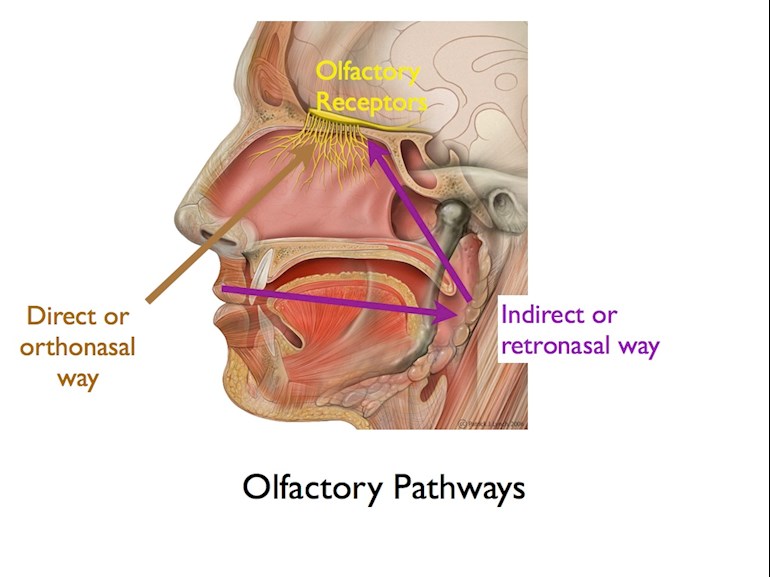Our sense of smell is the only sense that has a direct connection to the Central Nervous System. Olfactory stimuli go straight into the Limbic System in the brain. The olfactory neurons are the only part of our nervous system directly exposed to the ambient environment and are uniquely vulnerable to toxin exposure.
1. Volatile odors in the form of molecules are inhaled through the nostrils and detected by olfactory receptors in the sensory epithelium, which is located in the olfactory cleft.
2. The olfactory cleft contains narrow passages in the upper part of the nasal cavity - when we inhale, the molecules are funneled toward the olfactory receptors.
3. Cilia binds with odor molecules and olfactory receptor cells, which cilia are attached to, and creates an impulse.
4. Olfactory neurons transmit signals from the Peripheral Nervous System to the Central Nervous System, via the olfactory bulb.
5. The olfactory bulb processes the signal and sends it to the Limbic System, without having to go through the spinal cord.
6. The Olfactory Bulb, Cerebellum, Brain Stem, Basal Ganglia, Amygdala, Thalamus, Hippocampus, Hypothalamus, Cingulate Gyrus and Corpus Callosum; are all part of the Limbic System.
7. The Limbic System is responsible for emotion, learning and memory. The amygdala is considered the emotion center of the brain and the hippocampus is responsible for the formation of new memories about past experiences.
When your olfactory system is injured by toxins, so is your limbic system.
There are three major chemosensory systems: Taste, Smell and Chemesthesis.
A. The Gustatory System is responsible for the perception of taste and flavor.
B. The Olfactory System is responsible for the perception of smell and odor.
C. Trigeminal Chemesthesis is the sense of touch, pain and temperature.
The Trigeminal Nerve has three major sensory branches: Ophthalmic, Maxillary and Mandibular, which enervate the face, scalp, cornea, and mucous membranes of the the mouth and nose; and relays chemosensory information to the thalamus. The perception of chemical agents is strongly linked to memory, and plays a fundamental role in the sensation and overall "flavor" of foods, including sweet, sour, salty, bitter and umami.
The trigeminal chemosensory system consists of polymodal nociceptive neurons and their axons in the trigeminal nerve (Cranial Nerve V.). These neurons and their associated endings are typically activated by chemicals classified as irritants, including air pollutants, ammonia, ethanol (liquor), carbon dioxide (in soda), menthol, and capsaicin (the heat in chili peppers). The polymodal nociceptors alert us to potentially harmful chemical stimuli that have been eaten, inhaled or come into contact with the face and are closely tied to the trigeminal pain system.
Many compounds classified as irritants can also be recognized as odors or tastes: however, the threshold concentrations for trigeminal chemoreception are much higher than those for olfaction or taste. When potentially irritating compounds are presented to people who have lost their sense of smell, perceptual thresholds are found to be approximately 100 times higher that those of normal subjects who perceive the compounds as odors. Another common irritant is ethanol (liquor). When placed on the tongue at moderated temperature and high concentrations - as in drinking vodka "neat" - ethanol produces a strong burning sensation.
A variety of physiological responses mediated by the trigeminal chemosensory system are triggered by exposure to irritants. These include increased salivation, tearing, nasal secretion, sweating, decreased respiratory rate and bronchoconstriction. Consider the experience of eating a Ghost Pepper!
I can attest to all of the above and didn't understand my extreme reaction to irritants some people can't even smell.
Is it really that bad? Yes. it. is.
Is it all in my head? Not. a. chance.
